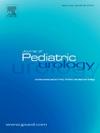Parental regret following decision for sons to undergo elective post-neonatal circumcision
IF 2
3区 医学
Q2 PEDIATRICS
引用次数: 0
Abstract
Introduction
The reasons for performing a circumcision among males after the neonatal period are usually cultural or medical. We aimed to evaluate parental regret for providing consent and to identify factors associated with such regret.
Methods
Included were the parents of males aged 6 months to 18 years who underwent circumcision under general anesthesia at a single center between 2/2017 and 01/2023. Those who underwent additional surgical procedures during the same session were excluded. Parents responded telephonically to the Decision Regret Scale (DRS) questionnaire. Regret was classified as none (0 points), mild (1–25) or moderate-to-strong (26–100). Surgical and demographic data were retrieved for comparison to DRS scores and identification of predictors of parental regret.
Results
In total, 201 of the 265 suitable patients met the inclusion criteria. Parents of 130 patients (65% response rate) whose average age was 5.06 (IQR 1.58,7.53) years completed the DRS questionnaire (study group). The average time since surgery was 41.8 (IQR 25.4,59.3) months. Forty surgeries were undertaken for cultural reasons and 90 for medical considerations. Eighteen parents reported regret (15 mild and 3 moderate-to-strong) for their decision to consent to their son's circumcision. The time from responding since surgery was the only significant variable in the DRS scores, with a 33-month gap predicting no regret (p = 0.02 compared to shorter gaps). The reasons for circumcision did not significantly differ between the "regret" and "no-regret" groups (p = 0.23).
Discussion
Our current investigation revealed a lower incidence of parental regret when compared to previous reports following distal hypospadias repair, likely attributable to the lower complication rate associated with circumcision. Our data reflect the experience of a single center in a country where neonatal male circumcision is routinely performed for cultural and religious reasons, thus precluding the generalization of our findings to places where post-natal circumcision is less commonplace.
Conclusion
Consent to their son's post-neonatal circumcision was regretted by 13.8% of parents. Time since surgery significantly influenced the reduction of their negative attitudes.
Summary Table. Clinical characteristics of the study cohort stratified by parental decisional regret (n = 130)
| Variable | No decisional regret (n = 112) | Decisional regret (n = 18) | p-valuea |
|---|---|---|---|
| Age, years (median [IQR]) | 4.85 (1.59,7.41) | 6.37 (1.61,9.9) | 0.15 |
| Cultural reason | 35/40 (87.5%) | 5/40 (12.5%) | 0.23 |
| Medical reason | 77/90 (85.6%) | 13/90 (14.4%) |
IQR, interquartile range; DRS, Decision Regret Scale.
- a
- Categorical variables were compared with Fisher's exact test and continuous variables with the Wilcoxon rank sum test.
父母在决定让儿子接受选择性新生儿包皮环切术后的遗憾。
导言:对新生儿期后的男性实施包皮环切术的原因通常是文化或医学方面的。我们的目的是评估父母对同意进行包皮环切术的后悔程度,并确定与这种后悔相关的因素:研究对象包括 2017 年 2 月 2 日至 2023 年 1 月 1 日期间在一个中心接受全身麻醉下包皮环切术的 6 个月至 18 岁男性的父母。不包括在同一疗程中接受其他外科手术的患者。家长通过电话回答了决定后悔量表(DRS)问卷。后悔程度分为无(0 分)、轻度(1-25 分)或中度至重度(26-100 分)。我们还检索了手术和人口统计学数据,以便与 DRS 评分进行比较,并确定父母后悔的预测因素:在 265 位合适的患者中,共有 201 位符合纳入标准。平均年龄为 5.06(IQR 1.58,7.53)岁的 130 名患者(回复率为 65%)的父母填写了 DRS 问卷(研究组)。平均手术时间为 41.8 个月 (IQR 25.4,59.3) 。40 例手术是出于文化原因,90 例是出于医疗考虑。有 18 位家长对同意儿子接受包皮环切手术的决定表示后悔(15 位轻度后悔,3 位中度到强烈后悔)。自手术以来作出反应的时间是 DRS 评分中唯一显著的变量,33 个月的间隔预示着不会后悔(与较短的间隔相比,p = 0.02)。包皮环切术的原因在 "后悔 "组和 "不后悔 "组之间没有显著差异(p = 0.23):我们目前的调查显示,与之前的报告相比,远端尿道下裂修复术后家长后悔的发生率较低,这可能是由于包皮环切术的并发症发生率较低。我们的数据反映的是一个国家的一个中心的经验,在这个国家,出于文化和宗教原因,新生儿男性包皮环切术是常规手术,因此我们的研究结果不能推广到那些产后包皮环切术不那么普遍的地方:13.8%的父母对同意其儿子在新生儿期后接受包皮环切手术感到后悔。手术后的时间明显影响了他们消极态度的减少。
本文章由计算机程序翻译,如有差异,请以英文原文为准。
求助全文
约1分钟内获得全文
求助全文
来源期刊

Journal of Pediatric Urology
PEDIATRICS-UROLOGY & NEPHROLOGY
CiteScore
3.70
自引率
15.00%
发文量
330
审稿时长
4-8 weeks
期刊介绍:
The Journal of Pediatric Urology publishes submitted research and clinical articles relating to Pediatric Urology which have been accepted after adequate peer review.
It publishes regular articles that have been submitted after invitation, that cover the curriculum of Pediatric Urology, and enable trainee surgeons to attain theoretical competence of the sub-specialty.
It publishes regular reviews of pediatric urological articles appearing in other journals.
It publishes invited review articles by recognised experts on modern or controversial aspects of the sub-specialty.
It enables any affiliated society to advertise society events or information in the journal without charge and will publish abstracts of papers to be read at society meetings.
 求助内容:
求助内容: 应助结果提醒方式:
应助结果提醒方式:


